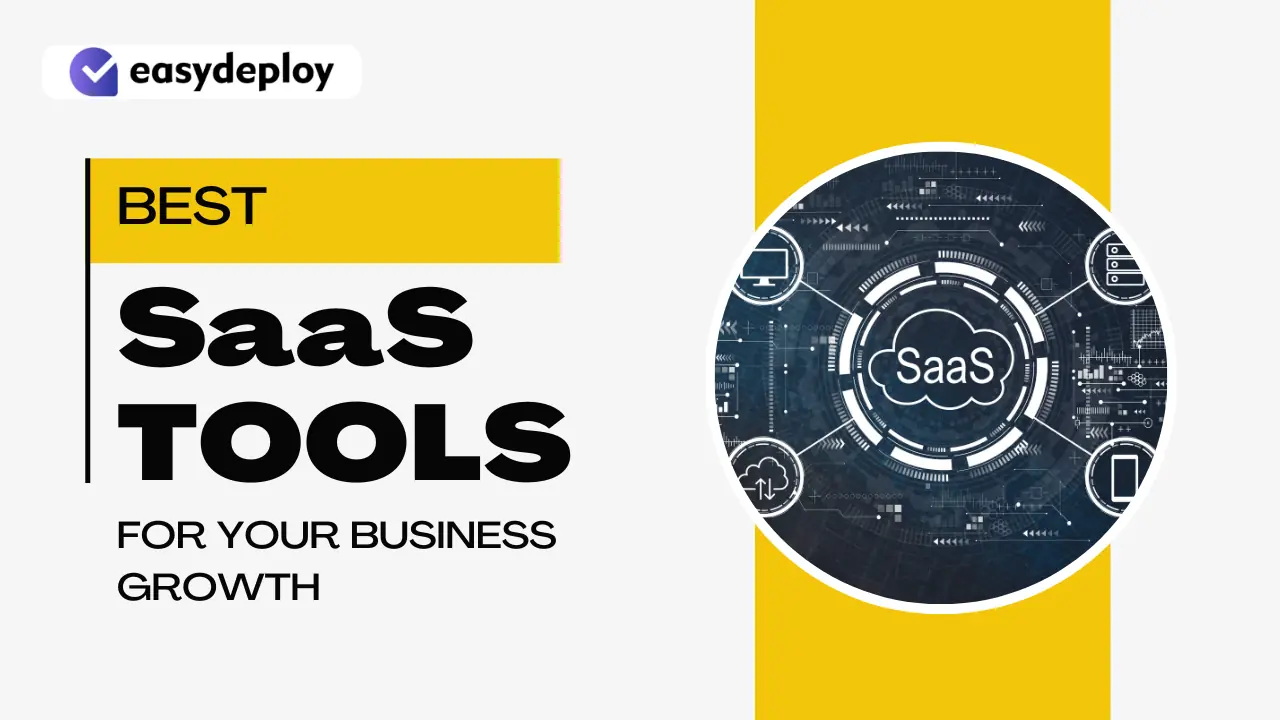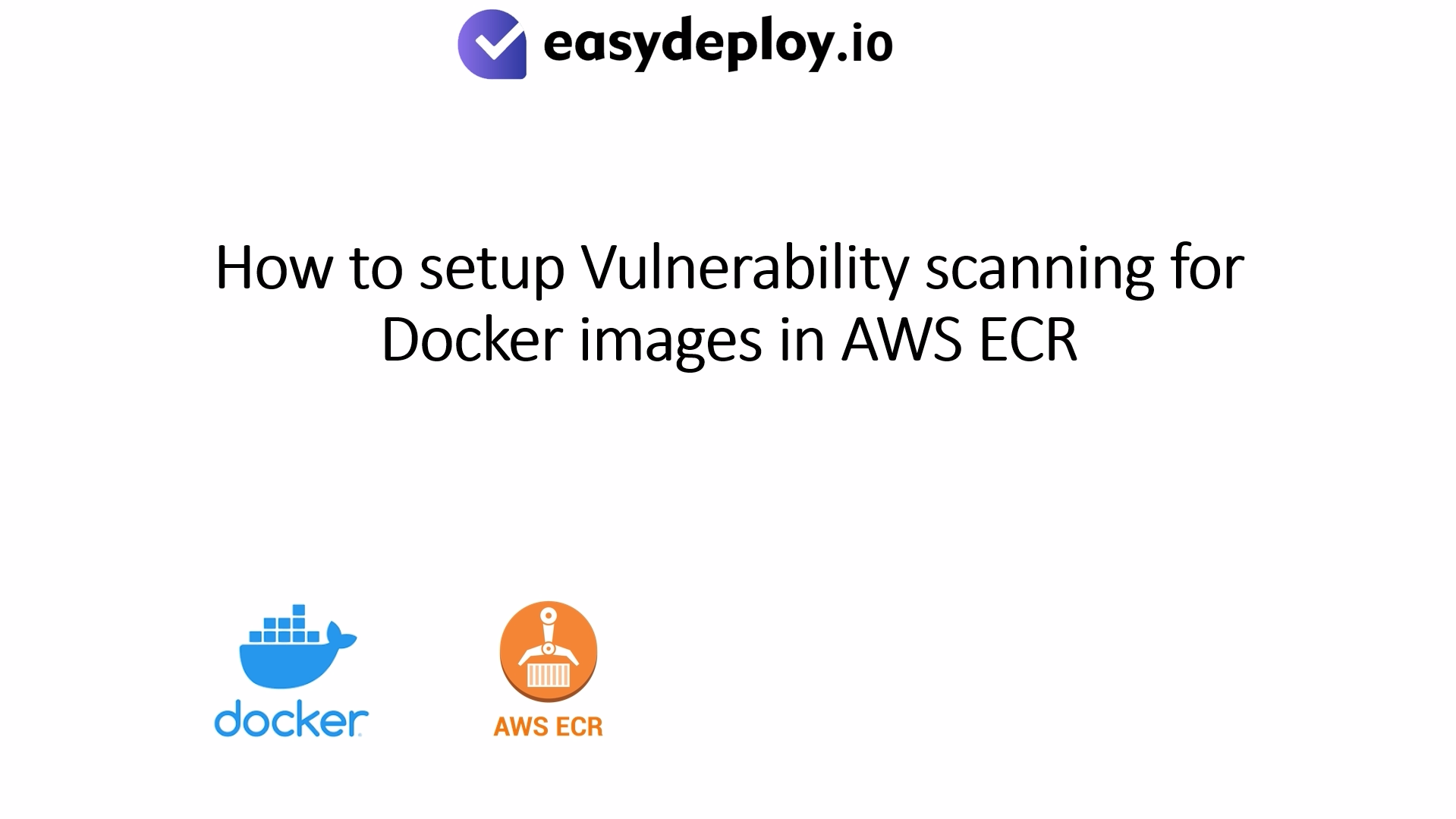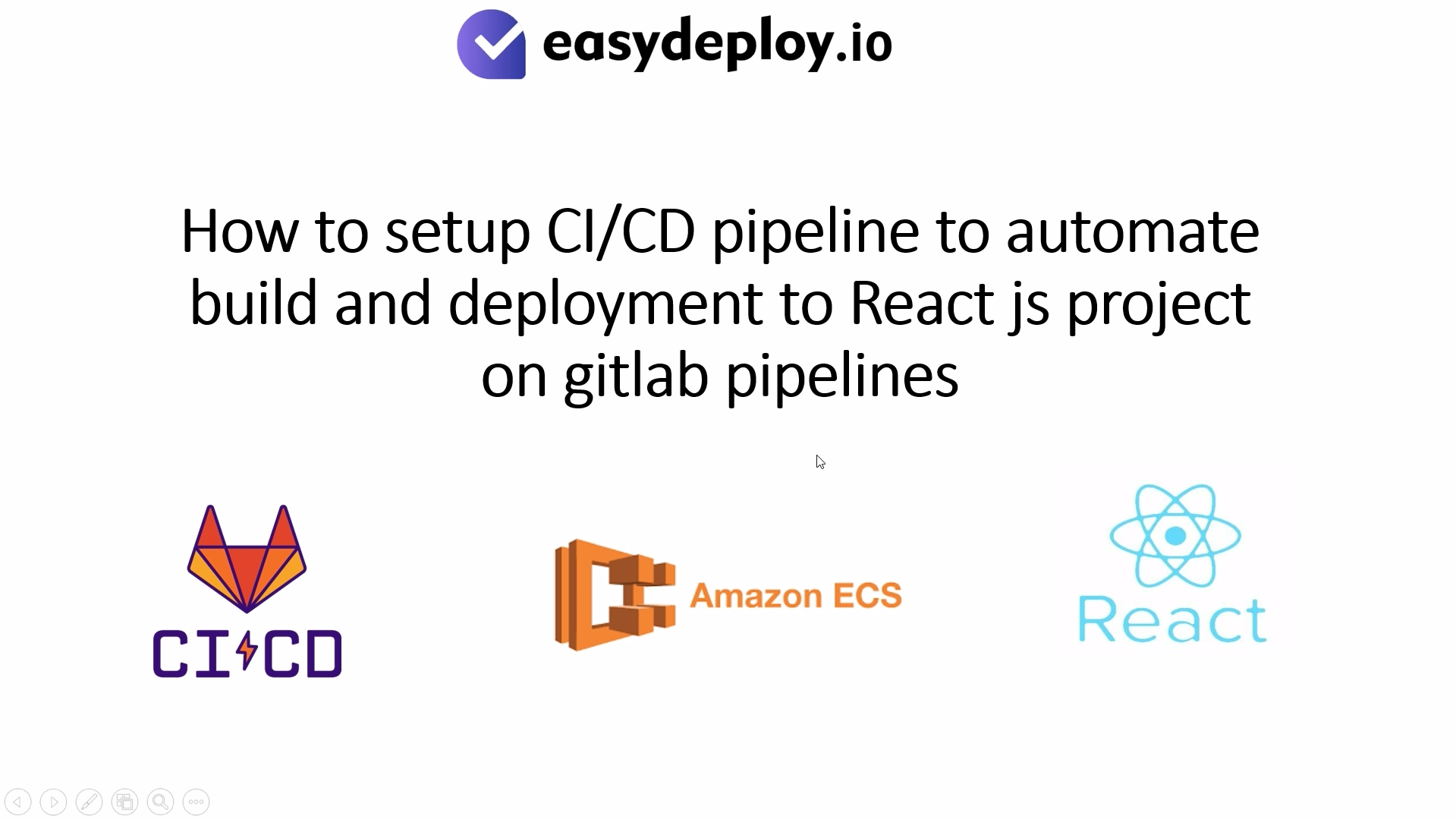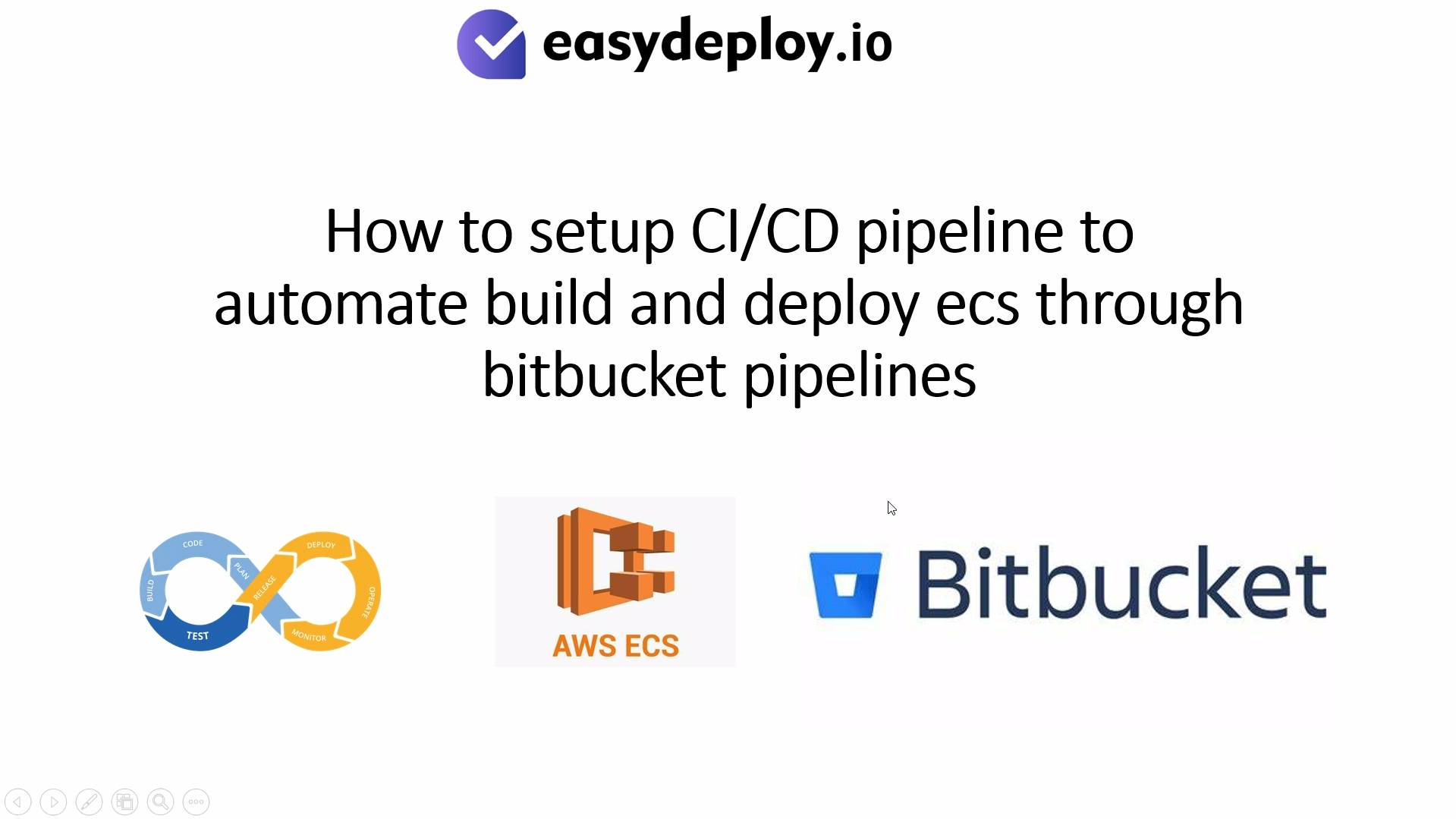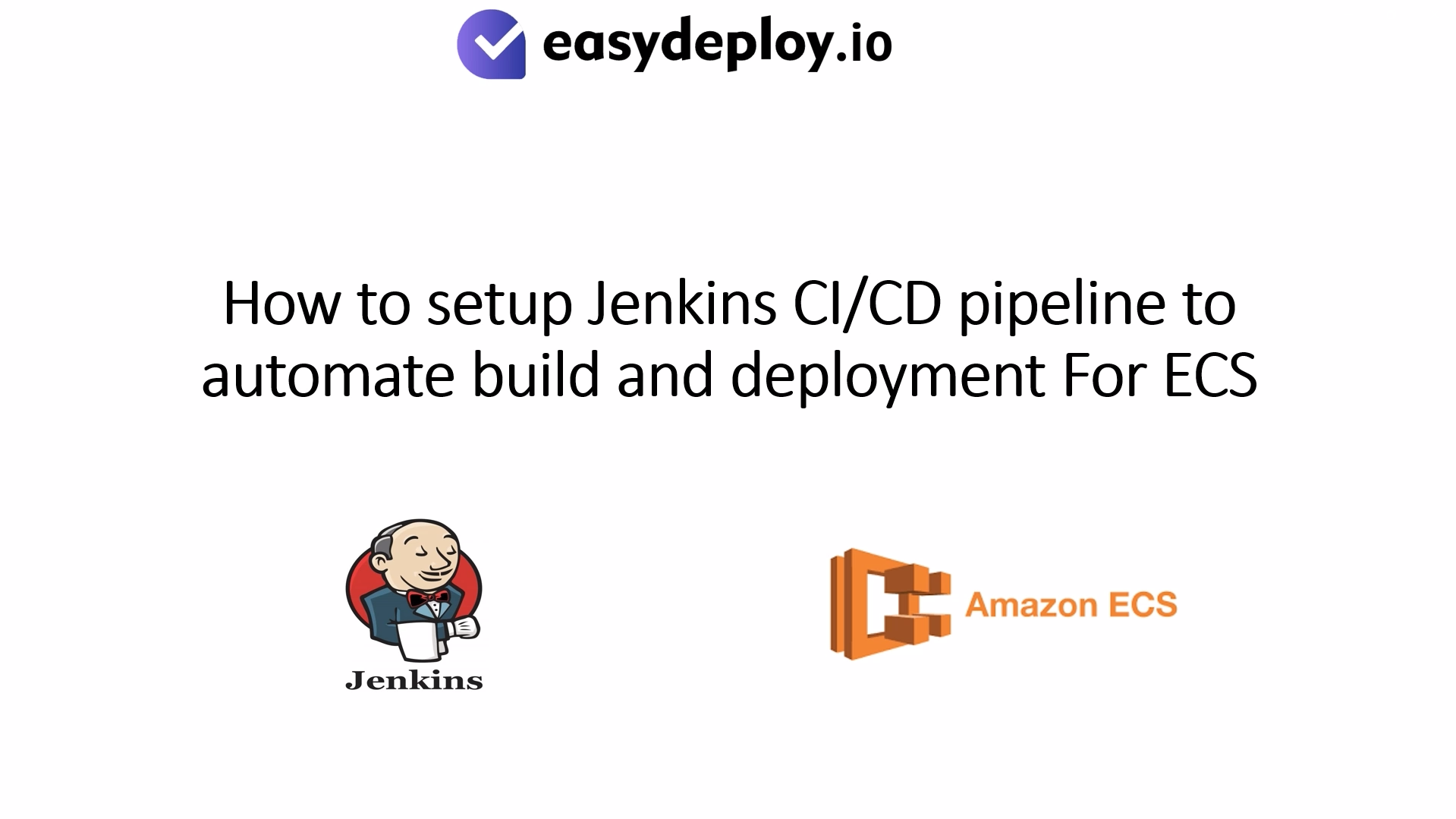Software-as-a-service (SaaS) tools play a pivotal role in automating critical business functions, ultimately fostering growth through enhanced efficiency.
Within the realm of customer success teams, SaaS tools are instrumental in fine-tuning the customer life cycle, thereby elevating the effectiveness of your marketing, sales, and customer service efforts, all of which collectively contribute to superior outcomes for your clients. This heightened focus on customer satisfaction and retention can, in turn, yield a notable uptick in sales and revenue.
In the following sections, we will provide guidance on the indispensable SaaS tools that are essential for propelling your business towards sustainable growth.
Let’s jump in!
What is SaaS?
Software as a Service, often referred to as SaaS, represents a method of providing applications as services over the Internet. Rather than dealing with the intricacies of software installation and upkeep, you can effortlessly utilize these applications through online access. This approach liberates you from the burdensome responsibilities of managing both software and hardware.
SaaS applications are alternatively known as web-based software, on-demand software, or hosted software. Regardless of the terminology used, these applications operate on servers maintained by SaaS providers. These providers take charge of tasks like managing application access, ensuring security, maintaining availability, and optimizing performance.
Characteristics and features of SaaS
Characteristics of SaaS
- SaaS Multi-Tenant Architecture: Multi-tenancy is an architectural approach where all clients and applications of a SaaS vendor share a unified infrastructure and code base, centrally maintained. This design empowers vendors to innovate more rapidly by freeing them from the burdens of managing outdated code, saving valuable development time.
- Easy Customization with SaaS: Users can effortlessly tailor applications to align with their specific business processes without impacting the shared infrastructure. The SaaS model accommodates each user’s and company’s unique customization needs, preserving them through regular updates. This results in more frequent upgrades by SaaS providers, with reduced customer risk and lower adoption costs.
- Enhanced Network Device Access: SaaS allows businesses to access data remotely from any networked device, simplifying privilege management, and data monitoring, and facilitating simultaneous access for multiple users to the same information.
- Harnessing the Consumer Web: SaaS applications often feature user-friendly web interfaces, reminiscent of popular platforms like Amazon.com or My Yahoo! This model enables easy customization through user-friendly interfaces, rendering the weeks or months required to update traditional business software seemingly outdated.
Features of SaaS
If your primary objectives include cost reduction and business expansion, leveraging SaaS features can significantly enhance your engagement with stakeholders, existing clients, and prospects.
Here are the top five ways SaaS features can benefit your business:
- Improve the identification and monitoring of leads during the sales cycle.
- Capture and share prospect and customer insights more effectively, fostering collaboration between sales and marketing teams.
- Optimize your digital marketing campaigns by streamlining marketing automation processes.
- Elevate data management capabilities within your organization.
- Store, organize, and track information about your customers, prospects, and sales leads more effectively, facilitating better contact management.
Also Read: Best Cost Cutting Strategies with SaaS service for Business (easydeploy.io)
What Are SaaS Tools?
SaaS (Software as a Service) tools are a set of computerized programs that help to improve business efficiency and success. This kind of tool can be employed to carry out various tasks, which include project management, Customer relationship management, automated marketing, and finance tracking.
The prime advantage of the SaaS tool such that it does not require any installation on physical devices such as computers, which are accessed via the internet.
Here are some examples of SaaS tools include:
- Project SaasS management tools help in task organization and meeting deadlines.
- Customer relationship management (CRM) tools help in tracking and enhancing customer service.
- SaaS tools for marketing help in marketing automation and thus help to achieve email and message management to customers.
- Accounting software helps track finances such as the amount spent & expenses.
Why do you need SaaS tools for your business?
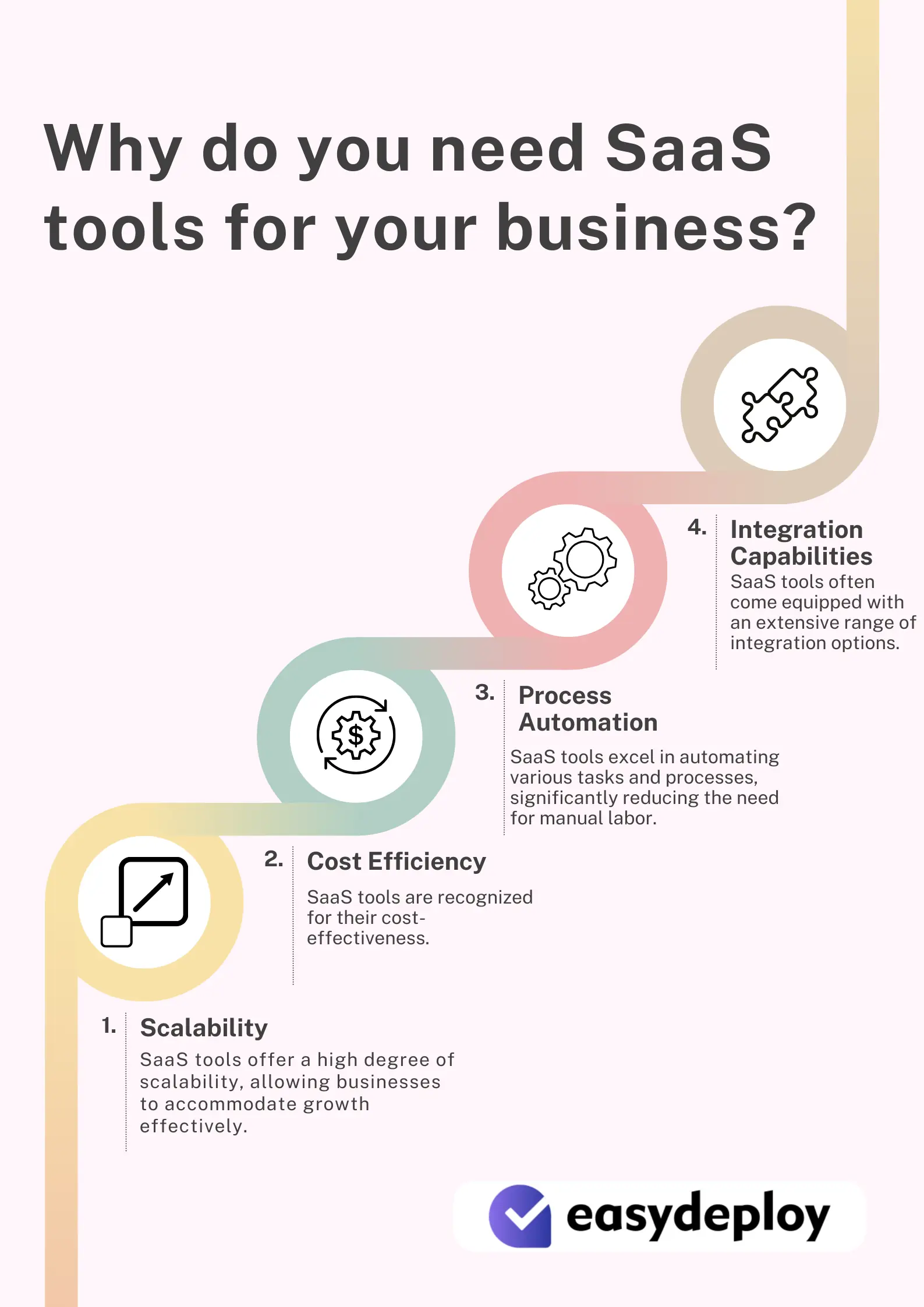
As previously mentioned, SaaS tools offer a multitude of advantages such as continuous updates and integrations. However, there are several additional compelling reasons for small, mid-sized, or established organizations to explore SaaS tools:
- Scalability: SaaS tools offer a high degree of scalability, allowing businesses to accommodate growth effectively. While in-house tools can be scaled, the continuous expenses associated with updates and maintenance often outweigh their utility, especially for mid-sized and small enterprises. SaaS solutions, by contrast, provide a more cost-effective and adaptable solution.
- Cost Efficiency: SaaS tools are recognized for their cost-effectiveness. They require only a fraction of the financial investment that in-house solutions demand. This financial advantage extends to larger corporations seeking to streamline their operations without incurring the long-term costs associated with in-house development.
- Process Automation: SaaS tools excel in automating various tasks and processes, significantly reducing the need for manual labor. For instance, email automation tools can replace manual email sending, enhancing overall efficiency and productivity.
- Integration Capabilities: SaaS tools often come equipped with an extensive range of integration options. These integrations enable seamless assimilation of new tools into the existing business ecosystem, mitigating data silos and allowing for the concurrent utilization of diverse tool features. This flexibility and compatibility can significantly enhance operational efficiency.
Best SaaS tools for business growth
Incorporating the appropriate SaaS tools into your business can fundamentally transform your approach to business development. These digital resources not only simplify various processes but also enhance productivity and cost-efficiency, making them invaluable assets for your organizational growth.
Here are some SaaS tools for your business:
Top Project Management SaaS Tool: Trello
Also Read: Role of SaaS Service in Your Business (easydeploy.io)
Trello is a popular SaaS tool for project management. It uses a Kanban system to simplify collaboration between team members.
Each Trello board represents a project, and columns represent different project states, like to-do, development, and QA. Each task or “card” can be assigned to team members, making it convenient for developers, QAs, and DevOps to work together. Trello offers data export options for flexibility but may lack some advanced features. Trello is one of the saas tools for developers.
Project Management Alternatives: Asana
Asana is a task-focused tool suitable for startups. It includes budget management, client portals, collaboration tools, Gantt charts, and more. It’s great for workload distribution and cost tracking.
ClickUp
ClickUp is known as the “one app to replace them all.” It’s scalable and suitable for various company sizes. ClickUp offers features similar to Trello but with additional capabilities. It’s a solid choice for growing companies.
Top Video Conferencing SaaS Tool: Zoom
Zoom is a user-friendly video conferencing tool with features like video call recording, screen sharing, and participant control. It’s versatile and works on various platforms.
Video Conferencing Alternatives: Microsoft Teams
Microsoft Teams is a chat-based application with video conferencing features. It integrates with Microsoft products and offers free and subscription versions.
Google Meet
Formerly Hangouts Meet, Google Meet is integrated with Gmail and Google Voice. It’s cost-effective and easy to use, supporting up to 250 participants.
Top Internal Communication SaaS Tool: Slack
Slack is essential for effective communication among teams, offering a searchable history, video and voice calls, and channel management. It also supports integrations with other companies.
Internal Communication Tool Alternatives: Microsoft Teams
Microsoft Teams is a hub for communication, offering audio and video conferencing, meeting scheduling, screen sharing, and document sharing.
Discord
Discord is well-known in the gaming world, offering lag-free communication via voice. It’s great for voice communication but lacks some file transfer capabilities.
Top Email Marketing Software: Mailchimp
Mailchimp is a versatile email marketing tool that includes A/B testing, analytics, audience targeting, and automation features.
Email Marketing Software Alternatives: Squarespace
Squarespace offers email campaign functionality for website users, but it has limitations in categorization and client tagging.
Active Campaign
Active Campaign offers CRM functionality and integrates with third-party tools, but it lacks a free version.
Top Help Desk SaaS Tool: Zendesk
Zendesk simplifies client support with a 360-degree view. It’s effective for support requests and data integration from various channels.
Help Desk Alternatives: Zoho Desk
Zoho Desk offers effective customer service and reporting tools. It’s great for businesses of all sizes.
Freshdesk
Freshdesk is ideal for small businesses, offering a free plan. It handles ticket management and provides collision detection.
Top Document Management SaaS Tool: Google Drive
Google Drive is cloud-based storage that supports file access from any device. It’s great for document management and includes other cloud-based services.
Document Management Alternatives: Dropbox for Businesses
Dropbox offers cloud storage and file sharing, supporting Twitter and shared folders. It’s ideal for collaboration.
Notion
The notion is a comprehensive knowledge and project management tool but has some complexity and limitations.
Microsoft 365
Microsoft 365 offers a suite of tools for document management, including Word, Excel, and PowerPoint, accessible online.
Top Accounting SaaS Tool: Quickbooks
Quickbooks is versatile accounting software that supports both on-premises and cloud-based accounting, offering features like payroll and payment management.
Accounting Alternatives: FreshBooks
FreshBooks is simpler and suitable for small groups. It provides business expense and invoice recording but may not be sufficient for large businesses.
Xero
Xero is an online accounting system that supports various merchant accounts and offers flat subscription fees for unlimited users.
What are the advantages of SaaS Tools?
There are myriads of benefits achieved by switching to SaaS tools. Here are some key benefits of using the SaaS tools:
By leveraging the SaaS tools, you can save time and you do not want to spend an hour on the software configuration and installation process as it is already done.
- SaaS tools allow you to save time, seeing as, contrary to traditional methods, the configuring and installing of the software has already been done.
- The software is shared among multiple clients, eliminating the need for individual configuration and maintenance. This results in cost savings for your business when using SaaS.
- SaaS also offers scalability and integration, making it simple to expand the software as your business grows.
Foster Business Expansion through the Right SaaS Solutions
Selecting the appropriate SaaS tools is a strategic move to position your business for long-term expansion. Specifically, when it comes to customer success, the right software can act as a catalyst to optimize the efficacy of the complementary tools discussed in this context.
EasyDeploy, for instance, is meticulously crafted to seamlessly integrate with other well-known SaaS solutions, offering an expeditious route toward achieving exceptional customer satisfaction and robust business growth.
Explore a live demonstration or take advantage of a free trial to experience firsthand the transformative potential of the right customer success SaaS tool for advancing your business’s growth prospects.
Conclusion
Hope we have recommended the SaaS tools for startups and small businesses to facilitate and enhance your business’s growth.
The SaaS model has become the prevailing standard for tech enterprises, offering customization, flexible payment options, scalability, accessibility, and low initial investments.
We hope you will find what you need in this list.

